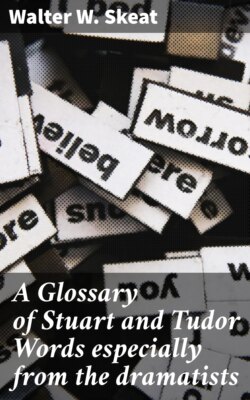Читать книгу A Glossary of Stuart and Tudor Words especially from the dramatists - Walter W. Skeat - Страница 8
На сайте Литреса книга снята с продажи.
B
ОглавлениеTable of Contents
babion, baboon. B. Jonson, Cynthia’s Revels, i. 1 (Amorphus); Drayton, Man in the Moon, 331; spelt babyone Skelton, ed. Dyce, i. 124, l. 163. F. ‘babion, a babion or baboone’ (Cotgr.).
bable, a ‘bauble’, a toy, trick, fancy. ‘Has fill’d my head So full of bables’ (some edd. baubles), Beaumont and Fl., Wit without Money, v. 4. 7; ‘That bable called love’, Lyly, Endimion, iii. 3 (Epi.). OF. babel, baubel, a child’s plaything (Godefroy); beau + bel, cp. F. bonbon.
bace, (Spenser); see base.
bacharach, backrack, the name of a wine. Fletcher, Beggar’s Bush, v. 2 (Vandunke); Bacrack, Butler, Hudibras, iii. 3. 300. From Bacharach, on the Rhine. See backrag.
back, a bat. Backes or reermice; Golding, Metam., iv. 415; fol. 49 (1603). The pl. backes is the form used by Wyclif, Coverdale and the Geneva Bible, in Isaiah ii. 20, where AV. has battes, see NED. (s.v. Bat). In Scotland the usual word for the bat is Backie (or Backie-bird), see EDD. (s.v. Backie, sb.1 1 and 2).
backare!, go back, keep back. ‘Backare! quod Mortimer to his sow; i.e. keep back, said Mortimer’; an old proverb, often quoted against such as are too forward, Udall, Roister Doister, i. 2 (Roister); Tam. Shrew, ii. 1. 72. See EDD. (s.v. Baccare).
backcheat, stolen apparel, lit. things from the back. (Thieves’ cant.) ‘Back or belly-cheats’, Fletcher, Beggar’s Bush, ii. 1 (Higgen). See cheat.
backrag, the name of a wine. Shirley, Lady of Pleasure, v. 1 (Bornwell); Mayne, City Match, i. 3 (near the end). See bacharach.
backside, a yard behind a farmhouse. Witch of Edmonton, iv. 1 (Old Banks). Very common in prov. usage, see EDD. (s.v. Backside, 2).
badger-nab, a strong little badger. ‘Meg [a witch] What Beast was by thee hither rid? Mawd [second witch] A Badger-nab’, Heywood, Witches of Lancs., iv. 1, vol. iv. p. 220. Cp. knab, a strong boy, a thickset, strong little animal (EDD.).
baffle, to treat with ignominy and contempt. It was originally a punishment inflicted on recreant knights, one part of it being that the victim was hung up by the heels and beaten. See Spenser, F. Q. vi. 7. 27; Beaumont and Fl., A King and no King, iii. 2 (Bessus); 1 Hen. IV, i. 2. 113; Richard II, i. 1. 170. See Trench, Select Glossary, and NED.
bag: phr. to give the bag, to cheat. Westward Ho, iv. 2 (Honeysuckle).
bagage, refuse, worthless stuff; ‘When brewers put no bagage in their beere’, Gascoigne, Steel Glas, 1082; Tusser, Husbandry, st. 21. An Essex word in this sense, see EDD. (s.v. Baggage, sb.1). Cp. Port. bagaço, ‘marc; ce qui reste de plus grossier de quelque fruit, qu’on a pressé pour en retirer le suc’ (Roquette).
bagatine, a small Italian coin, worth about the third part of a farthing. B. Jonson, Volpone, ii. 2 (Vol.). Ital. bagatino, bagattino, ‘a little coyne vsed in Italie’ (Florio).
bagle, a staff, or crosier such as a bishop carries. Bagle-rod, Phaer, tr. of Aeneid, vii. 188 (see the side-note). Icel. bagall, a crosier, L. baculum, a rod, staff.
bague, baghe, a ring, brooch. Caxton, Hist. Troye, leaf 54, back, 8; lf. 98. 11. F. bague.
baies, scoldings (?). ‘Ill servant ... deserveth hir fee to be paid hir with baies’, Tusser, Husbandry, § 81. 2.
bain, a bath. Chapman, tr. Odyssey, x. 567; to bathe, Greene, The Palmer’s Verses, l. 88 (Capricornus); bayne, Surrey, Desc. of restless state of a Lover, 13. F. bain.
bain, supple, lithe. Golding, Metam. iv. 354 (fol. 48); xv. 202; fol. 182 (1603). In common prov. use, see EDD. (s.v. Bain, sb. 1). ME. beyn, ‘flexibilis’ (Prompt.). Icel. beinn, straight; also, ready to serve.
bains; see banes.
bait, to stop at an inn to feed the horses, also to stop for refreshment; used fig. ‘Evil news rides post, while good news baits’, Milton, Samson, 1538. In prov. use in the sense of stopping to feed. See EDD. (s.v. Bait, vb.1 2).
bald, marked with white upon the head. Hence ‘bald coot’, a coot (Fulica atra); Beaumont and Fl., Knight of Malta, i. 1 (Zanthia). In prov. use (EDD.).
bale, a set of dice; usually three. B. Jonson, New Inn, i. 1 (Host); Heywood, Wise Woman of Hogsdon, i. 1 (Young Chartley); A Woman never vexed, ii. 1 (Stephen). See NED. (s.v. Bale, sb.3 4).
ball, a white streak on a horse’s face. Fitzherbert, Husbandry, § 73. Hence ball, as a horse’s name; orig. one marked with a white streak; Tusser, Husbandry, § 95, st. 2. Prob. of Celtic origin; cp. Gael. ball, spot, mark, Breton bal, a white mark on an animal’s face.
balloon, a game in which a large ball (like a football) was struck by the arm, which was protected by a stout guard. Eastward Ho, i. 1 (Sir Petronel); Chapman, Byron’s Conspiracy, iv. 1 (1st Lady). Balloo, in the phr. at the Balloo (B. Jonson, Volpone, ii. 1: Volpone), must be an error for at the Balloon, i.e. when playing at the game. Also balloon-ball, Middleton, Game at Chess, ii. 1 (B. Knight).
ballow, smooth. ‘Ballowe wood’, i.e. smooth wood without bark, see Nottingham Corporation Records, ed. Stevenson, vol. iv, Glossary (date of entry 1504); ‘The ballow nag’, Drayton, Pol. iii. 24. ME. balhow, smooth, plain (Prompt. EETS., see note no. 136).
